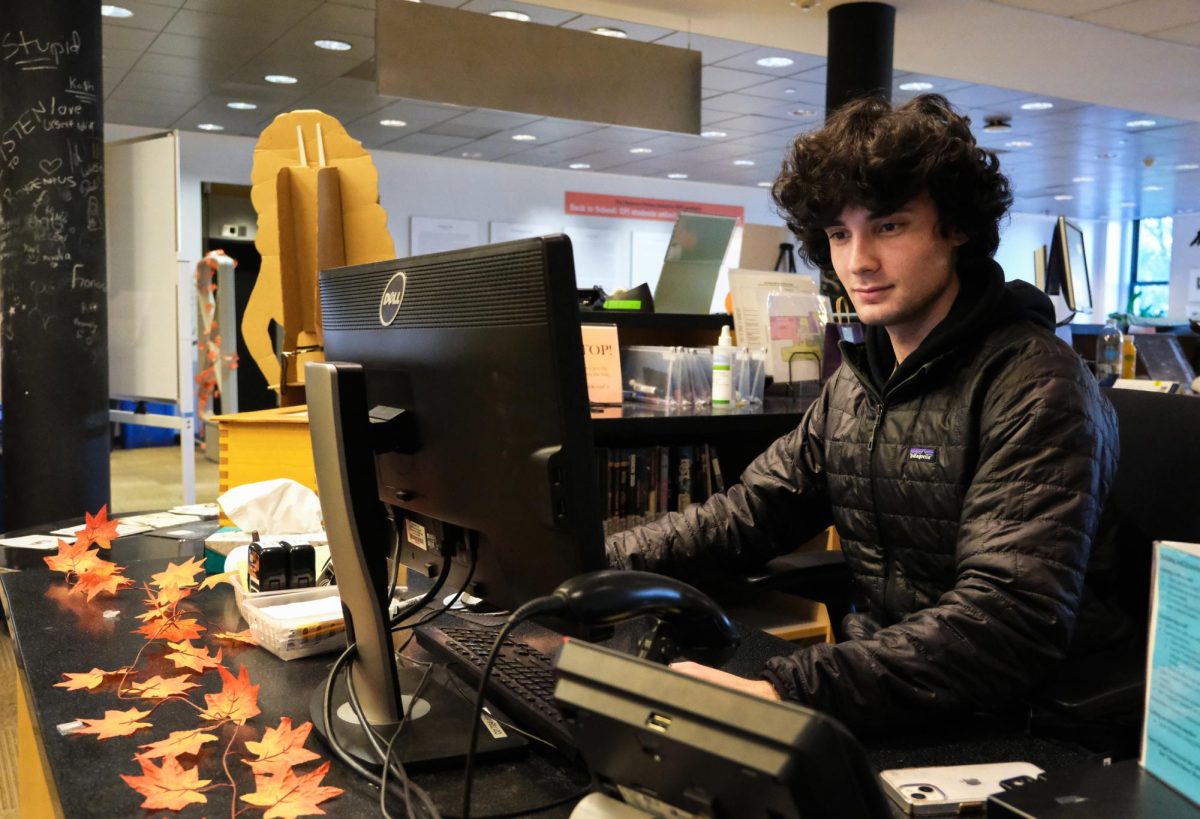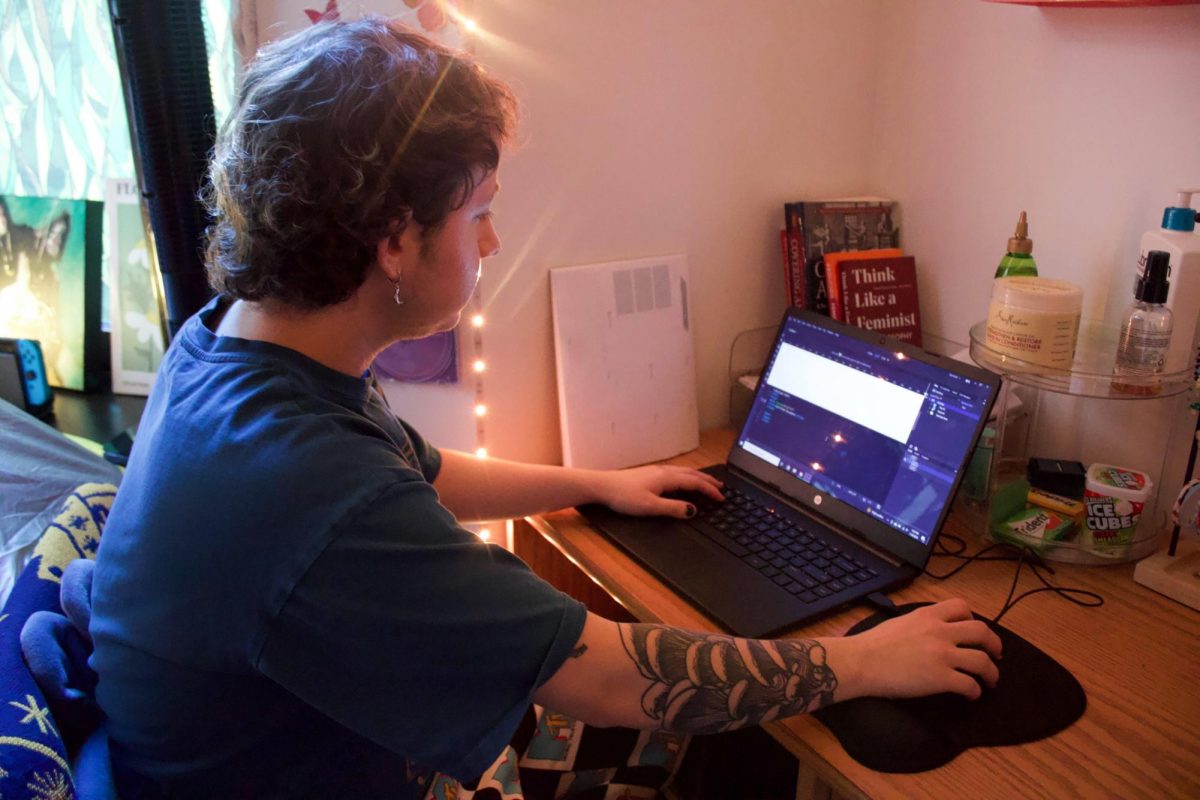With around 1,300 student positions available for Emersonians on-campus to take advantage of each academic year, how exactly does one pick the job that suits their needs and the hectic academic schedule?
Emerson offers a variety of positions with departments such as Campus Center, Emerson Channel, and Information Technology (IT), offering a unique opportunity for students to develop and add to their skills, in addition to making some income on the side.
Media Technology and Production, the Library, and the Residence Hall Welcome Desk are the most popular jobs available, according to Christopher Norfleet, manager of student employment programs for Emerson.
Williamson Mader, a sophomore visual and media arts (VMA) major, holds one of the more popular jobs on campus, a welcome desk assistant for Emerson residence halls.
“I had talked with a couple of the people asking what kind of responsibilities there were, and then I was pretty sold on it. Then when I had the chance to apply, I pounced,” Mader said.
Though Mader describes his responsibilities as a welcome desk assistant as relatively flexible with lots of downtime, he does admit it can get hectic at times.
“During a busy time of day in Little Building when everyone’s getting back from class at the same time, it sometimes gets a little too hectic, as a couple of people are checking people in and sometimes people have questions that require me to call someone and it’s a little bit of a juggle,” Mader said.
This year, Emerson’s service work study announced a new partnership with the Boston Symphony Orchestra, in addition to existing local non-profit partnerships with Jewish Vocational Services, Lyric Stage, and Jumpstart, providing an even broader range of choices for those who have Federal Work Study as a part of their financial aid.
Federal Work Study is a government program designed to assist students with the costs of post-secondary education.
Archer Issacson, a first-year political communications major, applied to several jobs this year with Federal Work Study as part of his financial aid package. Issacson, who works as a service desk attendant at the Iwasaki Library, said that the application process was stressful due to the rush after the first month of job postings. But after receiving an interview from his current boss, he feels that working at the library is a good fit for him.

Archer Issacson, a freshman political communications major, works at the Iwasaki library.
As a service desk attendant, his responsibilities include doing basic floor management, such as checking in and out of books, shelving books, maintaining library equipment, and answering questions to those in need.
“The hours are good, it’s a relatively low-stress job, and it’s really social which makes it nice to work here. The patrons and my co-workers as well as my boss are all great to work with,” Issacson said.
Issacson described how the low-stress and good hours contribute to a positive work environment.
“As someone who has experience in customer service jobs, it’s quite relieving,” Issacson said. “I’d say the only real downfall is if I’m feeling tired and there happens to be the occasional patron who’s not particularly kind.”
This particular downfall is a shared experience amongst other customer service on-campus jobs.
Heidi Garmise, a junior VMA major who works at the IT Help Desk as an assistant, said although the majority of the time everyone is kind, there are some not-so-pleasant customers at times.
“I just hope some people understand that a lot of us are student employees and there is only so much we can do, and [we] don’t appreciate frustrations taken out on us,” Garmise said. “And I feel that is a sentiment almost anyone who works in customer services can share.”
As an IT Help Desk assistant, Garmise’s responsibilities include answering phone calls and tickets, managing equipment rentals, and going on classroom assists to troubleshoot equipment.
Prior to working as an IT help desk assistant, Garmise worked in the media services department during her freshman year. As a VMA major, Garmise was attracted to the department as it gave her experience working with media and equipment. After holding the job for about a year, the merge of the media services department with the IT Help Desk to become “IT User Services” meant she would undergo a considerable amount of IT training.
“I would not consider myself as someone who works well with computers, so it was definitely a bit of an adjustment, but I really enjoy working at the help desk,” she said.
The full-time staff at the IT department always try to make working more pleasant by putting in effort into the work environment, Garmise said. That may consist of bringing in food during shifts or implementing the tradition of “IT Fun Fridays” when staff plans an afternoon full of food, movies, and games.
“My coworkers are very friendly and I love working with everyone. The staff here are really fun too. They made a meme wall in the back corner and we used to have a help desk and user services family tree. I ended up being one of the twin babies,” said Garmise.
What students look for in specific jobs varies, but unsurprisingly, many share interest in jobs related to their major that allow balance and flexibility with extracurriculars, academics, and work.
Kaden Bryant, a first-year writing, literature, and publishing major, applied and received the digital director position for Emerson Generic Magazine, a genre fiction magazine. As the digital director, Bryant transfers digital versions of the magazine onto the website via code.
“I picked the job because I like digital work and thought I had the skill set for it,” Bryant said.

Kaden Bryant, a first-year writing, literature, and publishing major, works on coding for Emerson Generic Magazine.
Riley Nemes, a junior journalism major, currently works at the Writing and Academic Resource Center (WARC) as a writing consultant. Her responsibilities include helping students with their writing, scheduling Zoom meetings, creating schedules, logging hours, and writing client reports.
“I picked working at the WARC because I felt that it would help me gain knowledge in copy editing and reviewing others’ work, which will help me with my publishing minor,” Nemes said.
Though Nemes’s position as a writing consultant gives her the ability to create a schedule that works best for her, she acknowledged that there are some downfalls with the flexibility.
“I have to manually put in all the hours I work on the Workday app, and if I miss submitting my hours more than twice I lose my job,” Nemes said.
Graduate students also have access to working on-campus jobs, but the nature of the work and pay rate largely differ from jobs selected by undergraduate students.
Norfleet explained graduate students often gravitate toward more specialized positions, such as research or teaching assistants, that offer up to $30 an hour compared to undergraduate entry-level positions that start at $15 per hour.
“Much like our undergraduate students, graduate students come from a wide variety of backgrounds and experiences,” Norfleet said. “For some undergraduate students, this may be their first job. Graduate students tend to have longer resumes as a result of undergraduate employment or professional post-graduate employment.”
The Office of Student Employment allows students to apply for a Federal Work Study or Emerson employment job through Workday. The website gives easy access to job postings, descriptions, requirements, and pay rates, as well as a direct link to the application itself. Emerson adjusts the pay range for positions to coincide with yearly increases in state minimum wage.